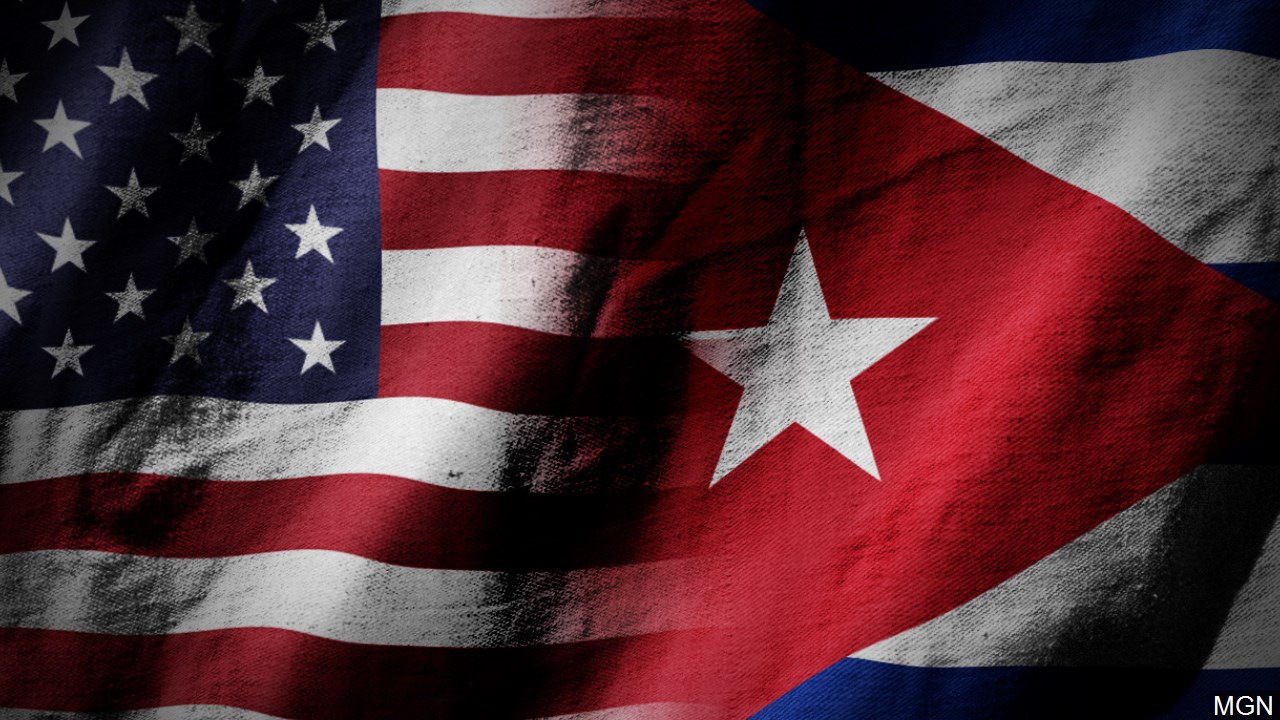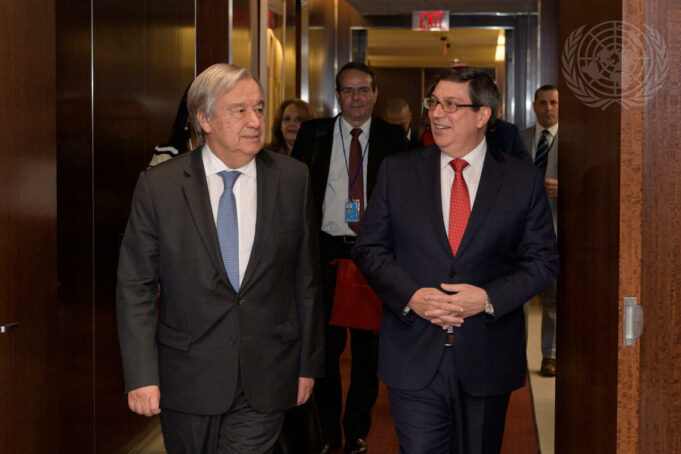Cuban government diplomatic officials, an international coalition of allies, the leaders of more than 180 countries and civil rights, social justice and human rights activists are gearing up to create a critical mass of support that will bring America’s embargo of the Caribbean island to an end.
Individuals and groups who took part in the recent International Conference for U.S.-Cuba Normalization have been busy working to achieve their goal. They have been encouraging city and council officials, mayors and other politicians to sponsor and introduce resolutions against the embargo; launched petition drives; organized workshops and seminars to educate potential supporters; and engaged in other activities.
“Since May 5, eight cities have passed resolutions against the embargo,” said Gail Walker, executive director of the Interreligious Foundation for Community Organization (IFCO)/Pastors for Peace and a longtime Cuba solidarity activist. “Labor, community activists, the faith community and an international coalition have been working. We’ve had 12 successful webinars, have reached thousands of new contracts and gained 3,000 distinct new emails to channel people into anti-blockade/Cuba solidarity work,” she said. “In 2021, we plan to launch decisive blows against the blockade.”
Academician and author Isaac Saney agreed. “We’re arming people with information, preparing actions and challenging the blockade in very specific ways,” said Mr. Saney, a conference co-chair and author of Cuba: A Revolution in Motion. “We’re fine-tuning the work in the U.S. and Canada.” The virtual conference was held Nov. 14-15.
The May 2021 date is important because the annual United Nations vote on the blockade, known as “el bloqueo” will be taken up by the General Assembly. The 2020 vote was postponed because of the coronavirus pandemic. In 2019, the General Assembly voted overwhelmingly for the 28th year to denounce the American economic embargo, rebuffing U.S. criticism of Cuban human rights violations. The UN and those who support the cessation of the embargo also criticized the Trump administration for policy of inflicting inhumane and harsh enforcement measures.

The vote in the 193-member world chamber was 187-3 with the U.S., Israel and Brazil casting “no” votes, and Colombia and Ukraine abstaining. In 2018, the assembly voted 189-2 with the U.S. and Israel voting “no” with no abstentions. General Assembly resolutions are unenforceable, and not legally binding but illustrate the position of countries around the world. Political experts see the vote as a way to demonstrate Cuba’s support globally and America’s isolation on this issue.
Bruno Rodriguez, Cuba’s foreign minister, said in 2019 the Trump administration has “aggressively intensified” implementation of the embargo against other countries, and has tried to prevent the arrival of shipments to Cuba “by resorting to sanctions and threats against vessels, shipping companies and insurance companies.”
“It does not conceal its intention which is economically to suffocate Cuba and to increase damage, scarcities and hardships on our people,” he added. “… The United States government does not have the slightest moral authority to criticize Cuba or any other country when it comes to human rights,” he said.

The foreign minister said the U.S. “blockade has caused incalculable humanitarian damages” and amounts to a major human rights violation. He and a number of Cuban and other critics of the embargo have painted what the United States is doing as exercising “imperialist domination,” seeking to overthrow the Nicolás Maduro government in Venezuela, increasing its military presence in Latin America and bullying other countries seeking to trade with or work with the Cuban government.
“Neither threat nor blackmail will ever extract the least political concession from us. We will not back down from our determination to achieve a civilized relationship with the U.S. government based on mutual respect,” Foreign Minister Rodriguez said.
Ms. Walker, a co-chair of the international conference, said President Donald Trump has imposed an aggressive series of measures against Cuba, most by Executive Order. “They can be reversed the same way,” she said.
For 58 years, 12 successive U.S. presidents and their governments—with one exception, the Obama administration—have strangled the island nation by prohibiting most commerce and trade, investment and travel to Cuba. The consequences for the Cuban people, one diplomat said during the International Conference for U.S.-Cuba Normalization, has been devastating.
“Pre-Covid, the U.S. embargo has cost Cuba $5 billion,” said Ambassador José Ramón Cabañas Rodríguez. “The core subject of any negotiation is the embargo. Without sustainability, we’ll have executive orders one way and the other way four years later. The embargo is not responsible, not ethical. It’s genocidal. The blockade kills people in Cuba, the U.S. and elsewhere. Simply tell your truth,” he said.
“The common will simply is to continue to fight against the blockade,” said Dr. Cabañas, a veteran diplomat who served as the Chief of the Cuban Interests Section in Washington, D.C., since 2012. “That is important to Cuba, the U.S. and third countries. This is the largest most comprehensive sanctions effort of any country in the world. America seeks to overwhelm Cuba.”
Ambassador Cabañas said Cuba’s growth and development has been stymied for the past 60 years by an embargo and a stiff regime of sanctions, adding that while sanctions are a means of cutting trade and in the end, it’s about food and medicine.
He and other speakers, said Mr. Trump, has introduced a staggering 235 new sanctions in the past year under his “maximum pressure” campaign which, among other things, imposes fines against banks, Western Union and other financial institutions to limit financial transactions; reduces Cuba’s access to oil supplies; blocks the government from procuring commodities for the populace; and put a cap on remittances.
“This has affected education, public health, agriculture and culture. Every part of Cuba life has been affected,” Dr. Cabañas said. “It also limits possibilities for America too. The U.S. government has imposed 121 measures to hurt travel and remittances … 60 years of blockade is too much. It is 60 years of a failed policy fiasco. It’s time to try something else.”
Cuba’s Ambassador to Canada Josefina Vidal concurred.
“The blockade has affected economic, commercial and financial relations of Cuba with the world. There have been dozens of measures and fines for hundreds and millions of dollars for countries who try to have financial relations,” she said. “There is the blacklisting of companies working with Cuba and fines to banks, mining interests and other businesses. There is the filing of lawsuits in the U.S. against these companies and the suspension of shipments of fuels, medicine and materials,” added Amb. Vidal.
“Different U.S. governments have argued that this is a bilateral matter and that other countries have no right to be involved. I disagree.”
In 2019, during the annual United Nations vote to end the embargo, Foreign Minister Rodriguez in published reports said the Trump administration has “aggressively intensified” implementation of the embargo against other countries, and has tried to prevent the arrival of shipments to Cuba “by resorting to sanctions and threats against vessels, shipping companies and insurance companies.”
“It does not conceal its intention which is economically to suffocate Cuba and to increase damage, scarcities and hardships on our people,” he said.
Even in the face of unprecedented economic hardships and the humanitarian impact on the Cuban people, those in solidarity with ending the embargo said American people understand the advantages of normal relations with Cuba, adding that there’s new hope for a change in U.S. policy with Joe Biden’s defeat of Mr. Trump on Nov. 3.
Mr. Saney said May 2021 is the moment that the United Nations will move on the necessity to end the Cuban embargo.
“It has the overwhelming support of the international community and the growing need of the Cuban people to escape this systematic, flagrant transgression of international law,” said Mr. Saney, a senior instructor and faculty member in the Transitional Year Program of the College of Continuing Education at Dalhousie University, and an adjunct professor of history at Saint Mary’s University in Canada. “Cuba is a powerful light for humanity and progress. It shows that a better life is possible. We can and must continue to fight to end the embargo.”













